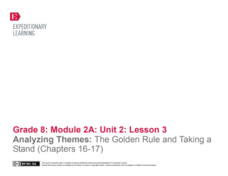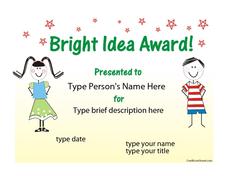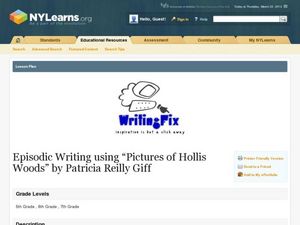Curated OER
Borrowing Narrative Skills from Mr. Fletcher: Using a "Prompts in Reverse" Technique to Inspire Your Writers
Help your class find their writing voices with this instructional activity which uses the work of Ralph Fletcher to guide a "Prompt in Reverse" activity. Using the chapter "First Pen" from Fletcher's Marshfield Dreams, learners decipher...
Franklin D. Roosevelt Presidential Library & Museum
What Does It Mean to be a Good Citizen?
Civics scholars are challenged to determine what it means to be a good citizen. Class members select three adults in their lives and interview them to discover what the term "good citizen" means to each of these people. The class then...
EngageNY
Analyzing Main Ideas and Details: Why Care about Water?
Pay attention to details! After completing text-dependent questions about paragraphs 10-12 of "Water is Life," scholars view the video "Why Care about Water. "They view the video three times and use a Main Idea and Details note-catcher...
EngageNY
Analyzing Text Structure: “Water Is Life” Paragraphs
Water, water everywhere. Readers revisit paragraphs six through nine in the article "Water is Life" to answer text-dependent questions. They then pair up to reread the article focusing on its structure and record their thoughts on...
EngageNY
End of Unit Assessment: Claims, Interactions, and Structure in “Is Money Affecting Your Social Status?”
It's not about the money. Scholars use the text Is Money Affecting Your Social Status? to complete their end-of-unit assessments. After finishing the assessment, they discuss how the text relates to their working definition of identity...
EngageNY
Analyzing Language, Character, and Theme: World Café Discussion
As part of their study of A Midsummer Night's Dream, class members meet in a drama circle to discuss and role-play scenes from the play. They then engage in an activity called World Cafe, analyzing the characters' actions from the text....
EngageNY
Four Corners: Taking a Stand in To Kill a Mockingbird (Chapters 24-26 Plus Synthesis of Scenes in Previous Chapters)
Think outside the box! Scholars work on the Frayer Model, completing boxes for the word integrity. They turn and talk with partners to discuss real-life examples and some from To Kill A Mockingbird. Readers then discuss integrity, taking...
EngageNY
Analyzing Themes: The Golden Rule and Taking a Stand (Chapters 16-17)
Positive or negative? Class members take another look at one of the taking-a-stand photographs from lesson plan one. They talk with partners to connect the picture to the text in To Kill A Mockingbird and discuss to determine when taking...
Trinity University
Explain Yourself: An Expository Writing Unit for High School
Introduce expository writing with a unit that asks writers to craft an essay to explain a belief, value, or priority that is important to them. Mini-lessons within the unit focus on crafting thesis statements and conclusions, selecting...
Teach Engineering
Keepers of the Gate Journal and Brainstorm
The second segment of a seven-part series reviews the challenge of determining whether gargling with salt water helps a sore throat. Individuals journal what they know about the challenge and what they are trying to figure out to...
EngageNY
Grade 9 ELA Module 3, Unit 1, Lesson 6
Are cattle prods beneficial for herding cattle, or do they cause more harm than good? Investigate Temple Grandin's claim about animal behavior with a instructional activity that focuses on pages 20-23 of the first chapter of her book,...
Teach Engineering
Design Step 3: Brainstorm Possible Solutions
Our young scientists have now specifically identified a problem, and this step helps them think of possible solutions. An outline, including guidelines, for brainstorming helps scholars stay on the right path. The resource includes...
Student Handouts
ABC Brainstorming Chart
Get your pupils' minds going with a brainstorm that goes from A to Z! Individuals fill out the chart with words, ideas, and concepts that start with each letter of the alphabet.
Certificate Street
Award for a Bright Idea
Encourage kids to think up great ideas and reward their thoughts and ideas by giving out awards. The certificate, a PDF document, allows you to type in the bright thinker's name, a description of their idea, the date, and your own name...
Curated OER
A Primary Source Picture Book
Travel through Europe with ten-year-old Teddy Roosevelt in this writing activity, which uses the picture book My Tour of Europe: by Teddy Roosevelt, by Ellen Jackson. After reading the book, readers compare it to passages from The...
Curated OER
Compare and Contrast Poems vs. Lyrics
Combine your pupils' love of music with their growing knowledge of poetry! First, have them bring in their favorite songs for a discussion on word choice and literary devices. Then, use a Venn Diagram to compare and contrast the...
Curated OER
Character Impressions
Whether you are planning a unit on F. Scott Fitzgerald's The Great Gatsby, or simply want to improve your pupils' descriptive writing, this instructional activity could be a good addition to your class. Using the Six-Trait Writing...
Curated OER
Color My World Grey and Blue
Can colors help to convey a mood in writing? Explore this question with your class using the songs "Grey Street" by the Dave Matthews Band and "Blu is a Mood" by Blu Cantrell. After analyzing the effect of the color words in these songs...
Curated OER
The Last Word: Using Critical Thinking and Analysis to Reach a Decision
Want to explore the process of writing a persuasive essay and tie it in with the upcoming elections? Class members use Venn diagrams and the hamburger model of persuasive writing to write a five-paragraph essay on elections and...
Curated OER
Persuasive Writing II
Help your young writers use logic in their persuasive writing. Discuss the characteristics of a persuasive paper, and have pupils work together to explore and solve a syllogism. They will write a short persuasive paper which includes a...
Curated OER
With Your Own Two Hands: Are You Changing the World or "Waiting for the World to Change"?
Can your pupils change the world? Explore this question with Ben Harper's song "With My Own Two Hands" and John Mayer's "Waiting for the World to Change." After listening to the songs, they discuss the tools at their disposal for...
Curated OER
Episodic Writing Using Pictures of Hollis Woods by Patricia Reilly Giff
Help your middle-schoolers expand their writing skills with this lesson on episodic writing, which focuses on story details, idea development, and organization. After reading "The Eighth Picture: End of Summer" from Patricia Reilly...
Curated OER
Same Theme, Different Story Using Fox by Margaret Wild
Middle schoolers work with themes in this lesson, which is based on Fox by Margaret Wild. Because the book has multiple themes, it is a great way to transition into exploring literary analysis and writing stories. A Six Trait writing...
Curated OER
The Presidential Quotation Report
Famous quotations by American Presidents are the focus of this Six Trait writing activity, which could be used in a U.S. History class or in language arts. After reading the picture book Theodore by Frank Keating, have your 7th graders...

























